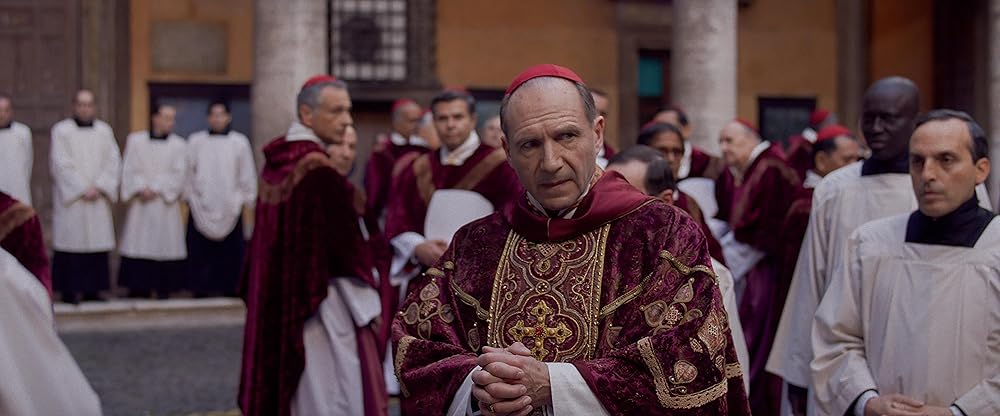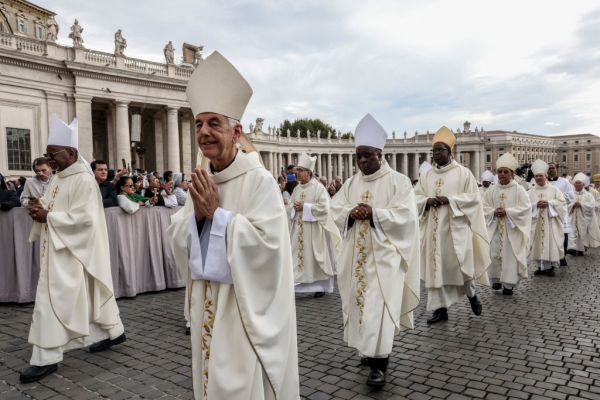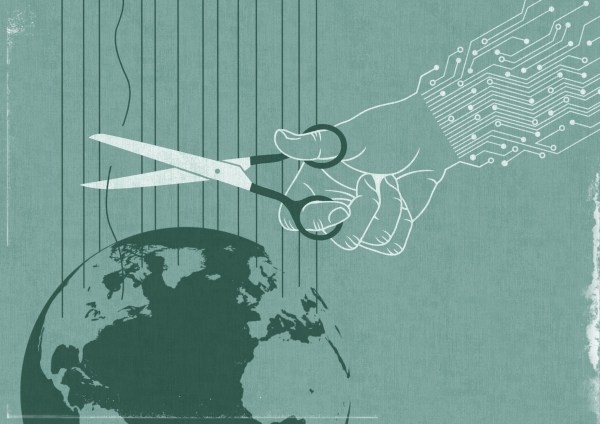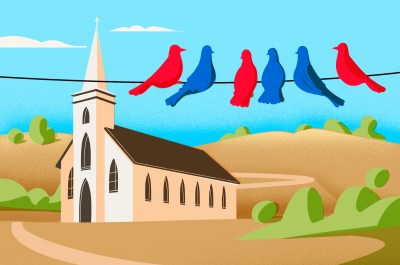It’d be nice to say we are less than 48 hours from the end of the nastiness of this election cycle, but to do so would be naive. For one, because the race between Kamala Harris and Donald Trump looks to be so tight, we are likely still several days away from knowing who will occupy the Oval Office next—and how much turmoil we’ll have to go through to get to Inauguration Day.
But it’s also all but guaranteed that the polarization embedded in the marrow of certain factions will not end once votes are tallied. That’s just as true in some faith communities as it is in any other community: Questions abound about the right criteria for casting a vote, how our respective faiths inform those decisions, and how to regard fellow believers who decided differently than we did.
Editor and writer Bonnie Kristian tackles that question head-on in today’s Dispatch Faith with a simple reminder: Believing that living a moral life necessitates living a combative life is wrong.
Bonnie Kristian: After This Election, How Do We Live With One Another?

Well, it’s nearly over. Election Day is almost here, and how it will end I dare not predict. The only sure forecast I’ve been willing to venture—as someone who lives in a purple part of a purple state, with signs for both candidates on my block—is that it was always going to be a close race.
There’s plenty of political analysis teasing out what’s in store in the weeks and years ahead. But the more immediate question for most of us, especially people of faith and even those who live in a more politically homogenous area, is: How do we live with one another?
After a grueling two-year election, it may be tempting to set that question aside, to hope that it will sort itself out, that our political differences will disappear with those campaign signs. We hear a lot about polarization in America and the unspoken (and understandable) wish behind much of that conversation is that somehow, eventually, America might depolarize.
Somehow we might return to a point where the median Republican and the median Democrat are more alike than not. Somehow we might re-create the mid-20th century consensus, that period of relative major-party overlap that many of us still assume as a kind of baseline normalcy for American politics. And that wish may be particularly appealing if you feel yourself—perhaps newly—an unpopular political or religious minority, whether nationally or locally, in popular culture and mass media or in your family or workplace or church. Maybe everyone else will just … come around?
What I want to suggest here is twofold: First, that this wish for depolarization will probably go unfulfilled, at least for the foreseeable future. It certainly isn’t a prospect on which we can rely. But second, that this is not cause for despair. That’s not because our differences don’t matter. In many cases, they matter very much. But they are not all that matters, and they do not determine how we treat each other.
This may sound very blithe right now, whether you’re troubled by one or both of the possible outcomes of the presidential race, or by the overall drift of our culture, or by all of it. It may even sound worse than blithe: silly, naïve, kumbaya oblivion to a country divided against itself. The last year has been dominated by debate over abortion, immigration, war, and rumors of war. It’s easy to make a case, if you take these things seriously, that a moral life will be a combative life—that if you’re true to your convictions, you will end friendships, ostracize family, and change churches and jobs when the disagreement becomes too great.
Maybe, sometimes. For instance, there are lines across which a fellow Christian’s politics would lead me to question her faith and whether we really ought to go to church together. But whenever the question is raised of cutting people off over politics, as it recently was by J.D. Vance and others, my instinctive answer is no.
That’s not because I’m politically ignorant or ethically blasé; on the contrary, most of my job as a writer amounts to issuing ethical judgments, often about politics. My favorite part of my church’s communion liturgy is when it says that, by his resurrection, Jesus “broke the bonds of death, trampling Hell and Satan under his feet.” Even my taste in entertainment is colored by a strong interest in right and wrong; I love classic detective fiction partly because, as W.H. Auden argued in 1948, it has a dependable moral universe in which evil is exposed and condemned.
But I’m also a journalist with unusual enough theology (I can’t find a way around Jesus’ command of nonviolence) and politics (the libertarian moment has long since passed) to be an oddity in most newsrooms. More often than not, my closest colleagues disagree with me on major issues of church and state, God and country. And those differences have become even more apparent as I’ve moved further into editing roles: Over the years, I’ve strengthened many articles by writers with perspectives far afield from my own.
In a country increasingly sorted by our politics, I’ve come to value that experience as a kind of informal exposure therapy. I understand why disagreement over an issue like abortion feels like a good reason to end a friendship—it’s a matter of life and death from any standpoint. I get it. But also, in my beliefs about violence, I disagree on a matter of life and death with nearly everyone I know, including fellow believers and immediate family.
This is a big deal! If I’m right about what Jesus meant when he said to love our enemies, most of the church, now and in centuries past, has either grossly misunderstood or willfully ignored a significant command straight from the mouth of Christ. But even if so, my fellow believers are no less fellow believers. We disagree about this, and we live with it, because Christians can be at once faithful and wrong. The defining beliefs of Christianity do not answer every serious question Christians may have—far from it. I see the fruits of faithfulness in many Christians who disagree with me about violence, and I have no doubt there are undiscovered errors in my thinking, too.
On the subject of violence, let me tell you a story. It’s about a man named Dirk Willems who lived in Holland in the 1500s. Willems was an early Anabaptist, arrested by Catholic authorities for his “heretical” faith.
After some time in prison, Willems staged an escape. It was winter, and he ran across a frozen pond with a guard in hot pursuit. Willems had grown thin on jail rations and moved safely across the ice, but the heavier guard crashed through and began to drown. Though he could have used this opportunity to gain his freedom, Willems turned back and saved the guard’s life, hauling him out of the pond. For his pains he was recaptured, then condemned and burned at the stake. The account of Willems’ death in Martyrs Mirror, published a century after his execution, says he screamed in the fire for God’s mercy more than 70 times.
Christians in peace traditions tell this story because of Willems’ sacrificial love of his enemy. But he wasn’t executed for that. He was executed for his practice of credobaptism, the baptism of adults and children old enough to articulate their own Christian faith, instead of pedobaptism, the baptism of infants that is the norm among Catholics and many other Christian traditions.
Half a millennium later, it would barely be an exaggeration to say no one cares about baptism—not like that, anyway. The doctrine is often a dividing line between denominations, but even then it’s not uncommon to celebrate loved ones’ baptisms of the “wrong” kind. Christian college students might have a friendly debate about baptism in the cafeteria. But no one’s ending friendships over this, let alone murdering fellow Christians.
Yet that’s not because baptism is unimportant. For Christians of every stripe, it’s incredibly important. What we believe about baptism will shape our understanding of how God acts in the world, how we are cleansed of our sin, how we are welcomed into God’s family. For all Christians, despite our theological differences, baptism is tied to salvation. It is a matter of eternal life and death, yet very few of us are getting into dinner table spats over whether to dunk or sprinkle. Beliefs of this great weight can have theological and practical implications (like where and how we worship) without excusing—let alone necessitating—animosity and strife.
Toward the end of Mere Christianity, C.S. Lewis takes up the mystery of Christian behavior: “If Christianity is true why are not all Christians obviously nicer than all non-Christians?” It’s a reasonable question, Lewis says, in the sense that if we saw no difference in people’s behavior before and after conversion, we might fairly wonder whether the conversions were not “largely imaginary.”
But consider, Lewis continues, a scenario in which “Christian Miss Bates may have an unkinder tongue than unbelieving Dick Firkin.” We want to say that if Christianity is real, then it ought to be apparent in these two: Miss Bates ought to be kinder than Dick. But that’s the wrong comparison, Lewis explains. The right comparisons are “what Miss Bates’s tongue would be like if she were not a Christian and what Dick’s would be like if he became one.” For all you know, God has already done a wonder in Miss Bates, while Dick is frittering away a naturally good temperament.
“What can you ever really know of other people’s souls,” Lewis muses, “of their temptations, their opportunities, their struggles?” Give them grace—and seek it for yourself.
Lewis was speaking of right behavior, but I think something very similar can be said of right thinking—in politics and beyond. We all have an obligation to conform our thinking to the truth, just as we all have an obligation to be kind. But when we believe ourselves to be correct and others in error, we should remember how little we really know of their souls, their temptations, their opportunities, their struggles—and how likely it is that we too have serious mistakes lurking undiscovered in our minds.
So what does all this mean in practice? How do we live with one another? The details depend, I suppose, on the scale of the question.
In our family and friendships, we must “love each other deeply,” as the Apostle Peter wrote, “because love covers over a multitude of sins.” This verse makes me uneasy, I admit. Were I writing it, I’d want to say “a multitude of foibles” or “a multitude of annoyances” or “a multitude of misunderstandings.” But Peter—who can hardly be accused of being soft on evil or insufficiently committed to the truth—said “a multitude of sins.” And he knew a thing or two about wrongheadedness himself.
That doesn’t mean never confronting wrongdoing or wrong thinking. But it does mean weighing what’s worth the confrontation and what can be left covered. In many cases, I suspect behavior may be more easily addressed than ideas: I don’t like that we argue so much can land better than, Here’s why I think your politics are bad. And if we ever want a chance at correcting the politics—doing some small-scale depolarization, if you will—it will only be possible if we’re building on a foundation of love and trust.
At the level of the local institutions that most influence our lives, never neglect love, but do prioritize truth. This is particularly important if we find ourselves on the outs with the majority of society. You’ll need “cohesion and vision … to flourish as a minority,” as Seth Kaplan, an Orthodox Jew, wrote to evangelicals at Christianity Today.
Kaplan advised “four key elements of faithful living required to thrive as a minority: educating children separately from the broader society, marking space and time to bolster community cohesion, strengthening local institutions, and reducing the influence of secular media.”
Exactly what this looks like will vary by your faith and situation, but for my part, I think his guidance is exactly right. It’s useful at two levels: Within our faith communities and institutions, these practices form and unify us, reminding us of what we hold most dear—and that we hold it in common. And as we engage the wider world with those supports, disagreement will feel less like a threat. It’s easier to live in the courage of your convictions if you know those convictions well and are ensconced in a community that shares them.
Finally, at the national scale, remember how good we have it. We are polarized, yes. There is plenty of work to be done in our politics and governance. We squabble when we should debate, troll when we should be serious, doomscroll when we should take a walk. America at the end of 2024 has plenty of problems.
But we are also remarkably free and prosperous and safe to a degree even near-peer nations can’t match. There’s a reason almost no one makes good on those traditional election-season threats to move abroad—or, if they do, why they move with a valid American passport firmly in hand. Our lives, our Constitution, our country are the envy of much of the world. So yes, we have repairs to make, but we also have a house worth repairing.
How do we live with one another? For all our differences, we already do.
Luis Parrales: Conclave Devolves Into a Vatican Telenovela

For the website today, Luis has a review of the new film Conclave and finds its portrayal of a fictionalized selection of a new pope lacking.
A movie that tries to depict today’s Catholic Church certainly need not put on a harmonious facade. Catholic infighting is real. Cardinals and popes say careless and callous things. And divides between “conservatives” and “liberals”—political labels that frankly fail to describe their theological differences—evince widely different ways of looking at the world and the church’s role in it. But even a cursory look at the words of real cardinals reveals a far more profound faith in the Bellinis and Tedescos of the world.
Take a hot-button issue like the blessings for same-sex couples, a topic of heated debate in recent years. Even a supposed “liberal” like the Austrian Cardinal Christoph Schönborn grounds his support of the practice on an understanding of the church as a “Mater et Magistra, mother and teacher.” In 2021, for example, he remarked that gays and lesbians “want to see the Church as mother.” On Catholic-Islamic relations, even a supposed “conservative” like the late St. Pope John Paul II was faithfully committed to interfaith dialogue. In 1985, he told an audience of young Muslims, “I believe that we, Christians and Muslims, must recognize with joy the religious values that we have in common, and give thanks to God for them.”
Conclave’s problem is that it understands the church primarily in human terms, as simply another political body devoid of any good-faith piety. “The movie could take place in Washington, D.C., or within a company—Condé Nast,” Berger told Vanity Fair. In a sense, he’s certainly right: The church is not immune to the sort of prideful posturing that makes even cardinals “small and petty men,” as one character in the film rightly says. But Berger’s film never imagines that the men of the conclave don’t see themselves as C-Suite sharks or Capitol Hill politicos. As a result, their genuine striving toward a higher calling is largely absent from the film—with one notable exception.
Read the whole thing.
More Sunday Reads
- We’re now past Halloween, but for Religion Unplugged, Matthew Peterson profiles the real church—both its past and present—at the center of “The Legend of Sleepy Hollow,” the 1820 short story by Washington Irving: “This compounding enthusiasm for a haunted churchyard has resulted in tourism, which has taken its toll [on both] the church and the village of Sleepy Hollow during the Halloween season and beyond. ‘The church is often seen as a spectacle, and that’s not how we see it at all,’ said Rev. Jeff Gargano, pastor of Reformed Church of The Tarrytowns, which meets in the Old Dutch Church. … Gargano said he knows that the site will always be associated with a haunted legend and a creepy season. ‘We recognize its place in American culture,’ he said. ‘We will embrace that as just simply extending Christian hospitality to any who come for whatever reason.’”
- This time of year is when Hindus, Jains, Sikhs, and Buddhists all celebrate Diwali, the festival of lights. Simran Sohal of the BBC this week published several first-person accounts of how they celebrate—and why. “‘It’s honestly one of my favourite times of the year,’ Vedika Apte, 23, from west London says. The medical student has spent the past few days making ladoos—round Indian sweets—with her mum. ‘We’re still going to be eating them in two weeks,’ she says, but that is just the start of the festivities.”
A Different Kind of Sunday Show
Coming into the final days of this election, Religion News Service national reporter Bob Smietana stopped by the Dispatch Faith video podcast to talk about the religion stories that have most shaped this election cycle, the stories that will most shape the next presidential administration, and why he thinks organized religion—despite getting a bad rap in recent years—can be a force for good in a deeply polarized age.
A Good Word
We’ve had some art references in Dispatch Faith in recent months, and we’ve even had some sports. But for a little brevity in a heavy newsletter: How about both? ArtButMakeItSports is one of the best follows on all of social media these days (granted, that’s a low bar), and its concept is simple: Capture snapshots of modern sports moments that recreate well-known (or not) pieces of art. I dare you not to get lost scrolling through any of its feeds. Last week, NFL Films aired a great feature on the man behind the account and how he’s able to match the moment with the art so perfectly. Enjoy.






Please note that we at The Dispatch hold ourselves, our work, and our commenters to a higher standard than other places on the internet. We welcome comments that foster genuine debate or discussion—including comments critical of us or our work—but responses that include ad hominem attacks on fellow Dispatch members or are intended to stoke fear and anger may be moderated.
With your membership, you only have the ability to comment on The Morning Dispatch articles. Consider upgrading to join the conversation everywhere.